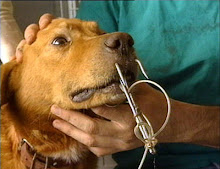China Drafts Nation's First Animal Protection Law
The International Fund for Animal Welfare (IFAW - www.ifaw.org) applauds China for drafting the country's first animal welfare legislation, which would make animal abuse and cruelty a punishable offence. A draft of the Animal Protection Law which outlines the basic standards for treating all animals in different situations is published online for public comment, from a legal conference in Beijing, China.
Recently, several Chinese cities have forged ahead with dog culls citing concerns of rabies, leaving tens of thousands of dogs brutally killed. Such slaughter would be stemmed should this law be passed.
In addition to releasing the draft animal protection law, changes regarding China's Criminal Law were also suggested, making animal abuse a punishable offence.
Millions of animals suffer horribly every year from cruelty in zoos and parks, on farms, markets and the streets, in laboratories and during the process of transport and slaughter. Often ignorant about how animals can feel pain, people treat animals only as a "resource" and do the cruelest things to them. Foxes are skinned alive for their fur. Bears have open wounds in their bodies to extract their bile. Tigers, with their teeth and claws pulled out, are chained to the ground for picture-taking with tourists. Cats are boiled alive before they are eaten. Dogs are clubbed and stoned to death in the name of "rabies prevention and population control."
"This is a very significant step for China, not only for the millions of animals that suffer from abuse and cruelty, but also for the country's image as it drives for social progress and harmony." Said Grace Ge Gabriel, IFAW's Asia Regional Director, "The cruel treatment of animals not only results in the suffering of the animals, but also in the degradation of society. Imagine what it does to children to witness these brutal acts, and to grow up thinking that it is appropriate to treat another living creature this way."
The need to have legislation banning the cruel treatment of animals is increasingly felt by Chinese people. Recently, after the cruel killing of over 40,000 dogs in Hanzhong, an online poll of 63,000 people found that 89% support the drafting of anti cruelty legislation.
The draft law outlines guidelines for disease prevention and medical care for animals. It covers wildlife, farm animals, companion animals, lab animals and work animals, and stipulates welfare requirements for animals in transport and slaughter.
The draft is developed by an expert team of researchers led by Professor Chang Jiwen at China's Academy of Social Sciences, supported by animal welfare groups such as IFAW. After the public comment period, the draft law will be proposed to the National People's Congress, the legislative body of China.
About IFAW (International Fund for Animal Welfare)
As one of the world's leading animal welfare organization, IFAW works from its global headquarters in the United States and 14 country offices to improve the welfare of wild and domestic animals by reducing the commercial exploitation of animals, protecting wildlife habitats, and assisting animals in distress. With projects in more than 40 countries, IFAW works both on the ground and in the halls of government to safeguard wild and domestic animals and seeks to motivate the public to prevent cruelty to animals and to promote animal welfare and conservation policies that advance the well-being of both animals and people. To learn how you can help, please visit www.ifaw.org.
Tuesday, September 29, 2009
Subscribe to:
Post Comments (Atom)

















2 comments:
I recently came accross your blog and have been reading along. I thought I would leave my first comment. I dont know what to say except that I have enjoyed reading. Nice blog. I will keep visiting this blog very often.
Keep it up
This is GREAT news! Now if only they could stop all of these unethical companies (many of them American) from making cheap toxic toys in China, not designed for dogs or thinking about their safety, and selling them over here for prices that ethical companies can't compete with.
All the best,
Ian
Paw Pets™
Post a Comment